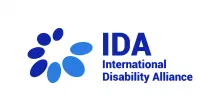The aim of the International Disability Alliance (IDA) is to promote the effective and full implementation of the UN Convention on the Rights of Persons with Disabilities (CRPD) worldwide, as well as compliance with the UN CRPD within the UN system, through the active and coordinated involvement of representative organizations of persons with disabilities at the national, regional, and international levels.
IDA is working to ensure the 2030 Agenda and its Sustainable Development Goals are realized in line with the UN CRPD. IDA supports disabled persons' organizations (DPOs) in engaging with UN human rights processes in Geneva and New York, including the Treaty Bodies, Universal Periodic Review, and Human Rights Council.
IDA supports DPOs at national and regional levels through trainings and disseminating resources and information.
With member organizations around the world, IDA represents the estimated one billion people worldwide living with a disability. This is the world’s largest – and most frequently overlooked – minority group.
Priorities as a partner of the Global Partnership for Sustainable Development Data
Together, IDA Members promote the rights of persons with disabilities across the United Nations' efforts to advance human rights and sustainable development. IDA supports organizations of persons with disabilities to hold their governments to account and advocate for change locally, nationally, and internationally.
One of IDA’s key projects is the BRIDGE Training program developed in partnership with the International Disability Development Consortium (IDDC). BRIDGE CRPD-SDG was devised to respond to increasing demands for trainings on the implementation of the Convention on the Rights of Persons with Disabilities (CRPD) and inclusive development, and how these link to achieving Agenda 2030 and the SDGs. It is a coordinated training investment, drawing from the resources and experiences of the IDA and IDDC networks and their members, and includes training on data advocacy.
Another priority of IDA is intersectionalities. The primary groups identified for this work include youth, older, and indigenous persons with disabilities, persons with psychosocial and intellectual disabilities, as well as persons with deaf-blindness, as they are the most vulnerable to intersectional forms of discrimination. Prioritizing these intersections, IDA is able to help contribute to the movement of disaggregating data in research.
IDA is also a large part of the Stakeholder Group of Persons with Disabilities on Sustainable Development. The Stakeholder Group of Persons with Disabilities is the focal point for UN DESA, ECOSOC, and the General Assembly for all UN Sustainable Development policies. The responsibility of the Stakeholder Group of Persons with Disabilities covers the Rio+20 outcome (including the 2030 Agenda), Sustainable Development Goals, High-level Political Forum, Financing for Sustainable Development, at global and regional policy processes of the United Nations.
In addition, Stakeholder Group of Persons with Disabilities for Sustainable Development aims to cooperate closely with other constituencies linked to other UN policy processes. With the leadership of the International Disability Alliance and the support of the International Disability and Development Consortium, coordinated inputs from persons with disabilities were provided to sustainable development processes, demonstrating a high level of engagement with intergovernmental processes at the UN.
It works across broad networks to support better data-disaggregation for persons with disabilities in sustainable development efforts around the world. The Stakeholder Group of Persons with Disabilities aims to enhance the opportunity for persons with disabilities, their representative organizations, and non-governmental and other organizations working on the rights of persons with disabilities to advocate with a unified voice for their inclusion in all sustainable development-related UN processes.
